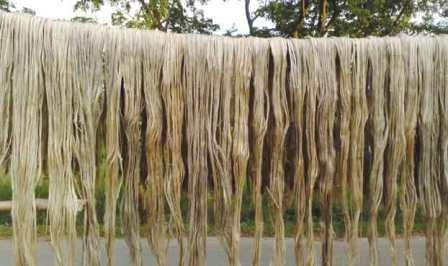New Delhi: India imposed restrictions on the import of jute and allied fibre products from Bangladesh in view of its “unfair trade” practices including circumvention of anti-dumping duty that harmed Indian farmers, people familiar with the matter said Saturday.
The new restrictions will apply to imports into India of Bangladesh’s jute and allied fibre products across all land and seaports, with the exception of the Nhava Sheva seaport in Maharashtra.
The punitive measures were announced Friday and they came into effect immediately.
There has been a sharp downturn in India-Bangladesh relations after deposed prime minister Sheikh Hasina fled Dhaka and took shelter in India in August last year in the face of a massive anti-government protest.
Bangladesh must not be allowed to persist with “unfair trade” practices that harm the livelihood of Indian farmers and mill workers in a sector that forms the economic backbone of rural regions, said an official on condition of anonymity.
The market access extended by India in good faith cannot be undermined to the detriment of India’s economic interests, said another official.
India’s decision on Bangladeshi jute and fibre products came weeks after it put restrictions on ready-made garments and several other consumer goods through land ports.
Under the provisions of SAFTA (South Asian Free Trade Area), jute from Bangladesh enjoys a duty free access to India.
However, the Indian jute industry has, for long, suffered due to the adverse impact of dumped and subsidised imports of jute products, particularly yarn, fibre and bags’?from the neighbouring country, the people cited above said.
There is credible evidence that Bangladeshi jute exports continue to benefit from state subsidies extended by the government of Bangladesh, they said.
In response to these concerns, the Directorate General of Anti-Dumping and Allied Duties (DGAD) conducted detailed investigations and imposed anti-dumping duty (ADD) on jute and goods originating from Bangladesh, the people said.
But, the imposition of ADD has not yielded a substantial reduction in imports, they said.
Apart from various subsidies, common malpractices by Bangladeshi exporters include circumvention of anti-dumping duty through technical exemptions, mislabelling, exports through ADD exempted firms and “misdeclaration” to secure higher subsidies, the people said.
The restrictions are aimed to counter unfair trade practices, promote ‘Atmanirbhar Bharat’ (self-reliance), and protect rural livelihoods tied to India’s domestic jute economy, the people cited above said.
“To safeguard the interests of the domestic jute industry and to counter the unfair trade practices employed by the Bangladesh exporters acting in collusion with Bangladeshi establishment, it has been decided to restrict Bangladesh imports of jute and jute products to India through only from Nhava Sheva port,” said one of the people.
“The imposition is expected to streamline the quality checking, prevent misdeclaration and fraudulent labelling, thereby neutralising the malpractices that have plagued the industry for long,” the person said.
“The government is also taking steps to ensure that exporters in Bangladesh do not circumvent the aforesaid restrictions by routing their jute exports through third countries,” he added.
PTI
